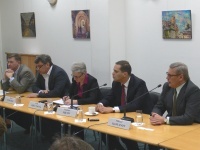Registration
You will receive an email confirming your registration.
IMGXYZ2984IMGZYXThe regime of personalized power that Russians have grown accustomed to is at risk of collapse. Mikhail Kasyanov, Vladimir Milov, Boris Nemtsov, and Vladimir Ryzhkov, leaders of the People’s Freedom Party “For Russia Without Arbitrariness and Corruption,” spoke at the Carnegie Moscow Center about how Russian politics could be changed by legitimate means. Carnegie’s Lilia Shevtsova moderated.
The Situation in Russia
Milov argued that Russia has entered a difficult period. Economic growth is slowing, taxes on the non-raw materials sectors are rising, and social and economic problems are increasing, creating significant social tensions. Kasyanov noted that public discontent is on the increase. But Russia does not have legitimate political mechanisms (especially independent political parties) through which citizens can present and address their grievances.
The policies being enacted by the current authorities are not up to the challenges Russia faces in the twenty-first century, Nemtsov added, and this could have very negative consequences for the regime.
People’s Freedom Party “For Russia Without Arbitrariness and Corruption”
The party held its founding congress in December 2010. Kasyanov, Milov, Nemtsov, and Ryzhkov were elected the party’s four co-chairmen. The party aims to become a legitimate mechanism for influencing the situation in Russia. Nemtsov said that although the party is very young, it has already held regional conferences in 42 regions.
- The party’s program: The party has four main priorities:
- Corruption: fighting corruption, which includes dismantling the system of corrupt bureaucracy and making the government accountable to the public;
- Democracy: returning to democracy, federalism, and local self-government;
- Rights: guaranteeing individual rights and freedoms and fighting state’s abuse of power;
- Business: creating the right climate for business development and setting the country on track toward European living standards.
- Corruption: fighting corruption, which includes dismantling the system of corrupt bureaucracy and making the government accountable to the public;
- Foreign policy: Milov explained that the party’s foreign policy seeks to reduce tension in Russia’s international relations and remove pressure through force as a policy option in Moscow’s relations with the post-Soviet countries.
- How the party differs from other Russian parties: In Ryzhkov’s view, what makes this new party different is that, for the first time, it tackles the issue of corruption in the upper echelons of power, insists on a return to elected state officials, and supports freedom for business activity and public organizations.
Getting the Party Registered and the Parliamentary Election
- Problems with party registration: To take part in the parliamentary election in December 2011, the party must fulfill a number of formalities and must be officially registered by the Russian Ministry of Justice. This process should be complete in June 2011. Over the last four years, however, seven parties have already been refused registration in Russia. The 1990 Organization for Security and Co-operation in Europe (OSCE) Copenhagen document that sets out the principles for holding elections in the OSCE member countries states that if all political forces do not have free access to take part in elections, they cannot be considered free and democratic. Kasyanov stated that there is a need to remind Russia of its international obligations to hold free elections, which means allowing the People’s Freedom Party to register.
- Chances of registration: Milov described two possible outcomes: either the authorities register the People’s Freedom Party—allowing it to take part in the parliamentary election at the end of 2011 as the only political party not dependent on the Kremlin—or the authorities refuse to register it, meaning that no opposition outside the system is represented in the election. This second scenario would greatly undermine the new authorities’ legitimacy, Milov contended, adding that refusing to register the party could lead to future social and economic upheavals. If, however, the party is registered, it could hope to win as much as 20 percent of the vote, according to the Levada Center’s public opinion survey. The party could propose its program as a political platform for action and propose to voters what to do next, Kasyanov said.
- A hopeful precedent: The experience of the Republican Party of Russia could give hope for the successful registration of the People’s Freedom Party. Ryzhkov, who is also a leader of the Republican Party, said that the European Court of Human Rights recently ruled that the 2007 Russian Supreme Court decision, which cancelled the registration of the Republican Party, was unjustified. He explained that the European Court ruled that Russia’s practice of banning political parties and refusing to register them was unlawful and in breach of Russia’s obligations as a member of the Council of Europe.
Summing up the meeting, Shevtsova noted that the four co-chairmen of the People’s Freedom Party have three tactical advantages: they have all spent time in government, but decided to go “into the streets”; they succeeded in organizing one of the biggest demonstrations in support for liberal democracy on April 16, 2011; and even in the absence of a single party leader, they are showing that the party can work effectively.
